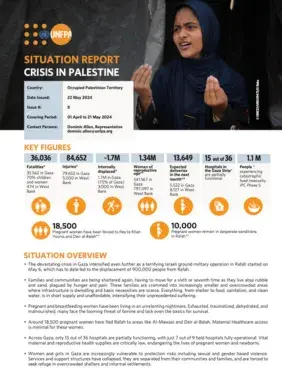Situation Overview:
- The devastating crisis in Gaza intensified even further as a terrifying Israeli ground military operation in Rafah started on May 6, which has to date led to the displacement of 900,000 people from Rafah.
- Families and communities are being shattered again, having to move for a sixth or seventh time as they live atop rubble and sand, plagued by hunger and pain. These families are crammed into increasingly smaller and overcrowded areas where infrastructure is dwindling and basic necessities are scarce. Everything, from shelter to food, sanitation, and clean water, is in short supply and unaffordable, intensifying their unprecedented suffering.
- Pregnant and breastfeeding women have been living in an unrelenting nightmare. Exhausted, traumatized, dehydrated, and malnourished, many face the looming threat of famine and lack even the basics for survival.
- Around 18,500 pregnant women have fled Rafah to areas like Al-Mawasi and Deir al-Balah. Maternal Healthcare access is minimal for these women.
- Across Gaza, only 15 out of 36 hospitals are partially functioning, with just 7 out of 9 field hospitals fully operational. Vital maternal and reproductive health supplies are critically low, endangering the lives of pregnant women and newborns.
- Women and girls in Gaza are increasingly vulnerable to protection risks including sexual and gender based violence. Services and support structures have collapsed, they are separated from their communities and families, and are forced to seek refuge in overcrowded shelters and informal settlements.
- A critical shortage of menstrual pads is adding another layer of misery to 690,000 women and girls of menstruating age. Some girls and women are using rags instead of pads and the lack of water means keeping clean is near impossible. Close to three-quarters of women and girls said they have no privacy to wash, with the same number reporting that they have no access to clean water.
- The heroic Local NGOs, including women-led organizations providing key GBV support services are on the brink of collapse. They face daunting challenges in maintaining protection services. They grapple with emotional distress, burnout, and operational hurdles, compounded by closures of safe spaces and acute shortages of supplies. Furthermore, fuel shortages, lack of cash, and unaffordable transportation severely hinder access to the few remaining protection services, leaving the most vulnerable women and girls without essential support.
- Humanitarian efforts face significant challenges due to profound insecurity compounded by the continuous closure of crossings, leading to critical shortages of aid and basic services for the desperate and terrified population. Aid workers including UNFPA staff are mentally and emotionally exhausted, hindered by safety fears, logistical hurdles, limited resources, and social disorder. There’s almost nothing left to distribute in Gaza, and what does arrive is nowhere near enough, forcing difficult choices and partial rations that try to prioritize the most vulnerable.
- In the West Bank, the situation is escalating rapidly with a lethal open-fire policy, daily search and arrests in towns and villages, and an alarming spike in violence by Israeli settlers against Palestinians across all cities. Movement restrictions continue to impede access to health and social services, the movement of ambulances, and the delivery of humanitarian assistance.


